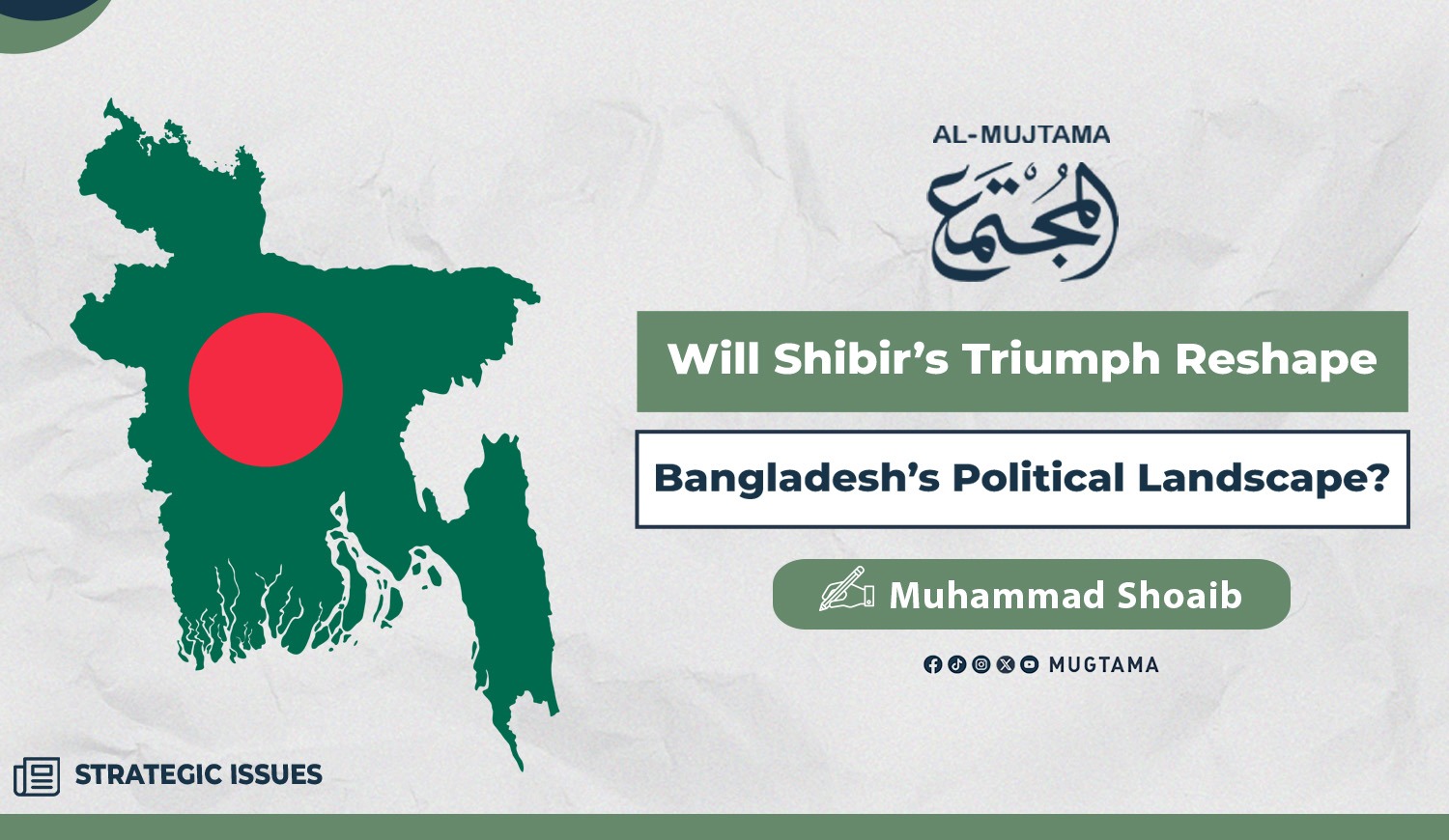Will Shibir’s Triumph Reshape Bangladesh’s Political Landscape?

The landslide victory of Islami Chhatra Shibir, a student wing of Jamat-e-Islami, in the Dhaka University Central Students' Union (DUCSU) and Jahangirnagar University Student Union (JAKSU) elections has made some people, including Islamists, happy, while others, including the Bangladesh Nationalist Party (BNP) and anti-Islam groups, are worried or concerned. However, it has surprised almost everyone. Indeed, it is surprising because the student organization that just a few days ago could not show its own identity in all universities, including Dhaka University and Jahangirnagar University, has achieved such a victory. It is really surprising.
Some people are happy with this result because, after several
decades, the monopoly of two dominant student groups, Chhatra League, the
student wing of Awami League, and Chhatra Dal, the student wing of the Bangladesh Nationalist Party (BNP), at
Dhaka University has come to an end. However, the question remains: why are
many people worried or concerned about Shibir’s victory?
The main reason for this is probably the continuous propaganda of the Indian media.
Although the people of Bangladesh love Islam, they have neither
tried nor imagined empowering Islamist parties. The Indian media has conveyed a
different message to them, namely that if any Islamist party comes to power in Bangladesh, they
will confine women to their homes, force them to wear the hijab, deprive them
of their freedom, and so on.
Not all those who are happy with Shibir's victory are Jamaat
supporters. Many among them are happy with a fundamental change in student
politics at Dhaka University and Jahangirnagar University Student Union (JAKSU). They
are fed up with the long-standing oppression and lawlessness of the Awami
League and BNP student organizations. Another group is
happy with the victory of anti-India Islamists in Bangladesh after a
long time, because they see India as the root of all problems in Bangladesh.
The Core Question: Can Student Triumphs Translate to National Votes?
Now the question is, will the victories of Jamaat-backed
student organizations in DUCSU and JAKSU influence the upcoming general election? Has
Jamaat-e-Islami managed to gain enough influence over public opinion that
people would choose them over other political parties?
Jamaat’s Strategy: Decades of Quiet Social Work and Discipline
The party was banned multiple times at the advice of India.
Although the party officially refrained from political activities in Bangladesh since
1972, its affiliated organizations continued to work quietly in almost every
district and sub-district of the country. In 1979, Jamaat began
working in the Rohingya refugee camps in Cox’s Bazar by providing medical
services. At different times, they came forward during natural disasters in
various districts. In short, even if not politically active, they remained busy
with social work. During this time, the party
also tried to increase its membership. They recruited students into their
student wing across different educational institutions. They had a reputation
for conducting activities in universities with organizational discipline, a
quality that other student groups lacked.
The Historical Electoral Failure of Jamaat-e-Islami
The question now is whether the victories of Shibir in DUCSU and JAKSU will enable Jamaat-e-Islami to win
the upcoming general election. To answer this, we must examine how successful Jamaat-e-Islami has been
as a political party in the past, both in Bangladesh and in
the erstwhile Pakistan. Objectively speaking, Jamaat-e-Islami
historically could not gain much advantage as a political party during the East
Pakistan era.
A Dreadful Period: Sheikh Hasina’s Crackdown on Jamaat (2009–2024)
Later, when the Awami League, supported by India, came to
power for the first time, they did not take strict measures against Jamaat.
However, in their second tenure, they attempted to uproot Jamaat from politics.
Several top leaders of Jamaat were tried at the International Crimes Tribunal, with
some receiving death sentences and others life imprisonment. In essence, the
rule of Sheikh Hasina (2009–2024) was a
dreadful period for Jamaat.
Infiltration and Building a New Identity
Although Jamaat was
ousted from formal politics during Sheikh
Hasina’s rule (their registration was canceled at this
time), they continued their activities. Islami Chhatra Shibir strategically infiltrated
other student organizations (such as the Chhatra League or Chhatra Dal),
working alongside students and building their identity. They have reaped the
benefits of this strategy, and we are witnessing those results today.
But will the identity of Islami Chhatra Shibir help Jamaat in a
nationwide election? In large-scale elections, the victory of any political
party depends on the prior recognition of its leaders, their credibility, and
their experience in governance. As a party, Jamaat-e-Islami remains
untested, although a few of its leaders did serve as ministers nearly three
decades ago, none of whom are alive today.
Collapse of Awami League Unites Islamist
Factions
Unity among Islamist groups has always been debated. From the
outside, they may look united, but in reality, they are often divided.
Different factions use theological differences against each other to gain power
and weaken rivals. In the late 1970s, there was an attempt to bring Islamist
forces together, but it failed. As a result, Islami
Andolan Bangladesh (IAB) was formed in 1987 as a separate
party.
Now, after long discussions and private negotiations among
Islamist leaders, it seems these groups are closer to unity than ever before.
The fall of Sheikh Hasina has worked as a unifying
factor, giving them common goals and benefits to work together.
New Contest Between Islamists and the BNP
For decades, politics in Bangladesh was led
by two big parties — the BNP and the Awami League (AL). Together, they won
about 70–80% of the vote. Other parties like Jatiya Party (JP) and Jamaat-e-Islami
(JI) usually got the rest. But after the fall of Sheikh Hasina’s AL government on August 5
and her escape from the country, the political situation has changed
completely. The AL has been banned for alleged mass killings. Its place in the
center-left of politics is now empty. The JP, which supported AL during its 16 years
in power, has lost credibility and is struggling to stay relevant.
In the past, elections were mainly between the BNP (center-right) and AL (center-left). But
this time, it looks like the contest will be between the Islamists (right) and
the BNP (center-right). The Islamists’ strong role in the July Revolution has given them new legitimacy in
the eyes of the people. Bangladesh may now see a parliament where
Islamic values play a much bigger role than before. The long-term results of
this shift are still uncertain.
The Islamist Agenda: Advocating for Proportional Representation (PR)
The Islamists’ call for a proportional representation (PR) voting system is part
of this strategy. While it serves their political goals, it also has practical
benefits. For example, it reduces the influence of money and muscle power,
since candidates cannot easily predict results. Under PR, it is very hard for one party to get an
absolute majority, which means less chance of authoritarian rule like Hasina’s.
The PR Debate: BNP Opposition and the Threat of Electoral Deadlock
At the moment, BNP is the most popular party, with more than
40% support. Under the current first-past-the-post system, they could win a
majority in parliament. But under PR, BNP would not get that majority. Instead,
smaller parties would gain seats in proportion to their vote share, creating a
more diverse and inclusive parliament. This is why PR benefits the Islamists but not the BNP.
BNP reacted quickly to IAB’s demand. Acting Chairman Tarique Rahman warned that PR could divide the country instead of uniting it. BNP leader Salahuddin Ahmed also argued that those pushing for PR and for local elections first actually want to delay or block the national election. This debate over the electoral system has become a key issue. If the major parties cannot agree, it could lead to election delays and a deadlock in parliament.












